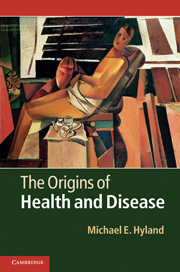Book contents
- Frontmatter
- Contents
- List of figures
- List of tables
- List of boxes
- Acknowledgements
- 1 The two philosophies: health, disease, medicine and psychotherapy
- 2 The body's mind: psychoneuroimmunology, stress and adaptive response
- 3 Personality, disease and the meaning of infornet dysregulation
- 4 Networks and their properties
- 5 The causes of dysregulation: associative learning, food intolerance and the effects of stress throughout the lifespan
- 6 The causes of dysregulation: supervised learning, repetitive strain injury, attention-deficit/hyperactivity disorder, chronic fatigue syndrome and depression
- 7 The causes of dysregulation: asthma and precursors to specific disease
- 8 Three different types of psychologically mediated therapy: placebos and the art of medicine, psychotherapy and complementary and alternative medicine
- 9 Therapeutic mechanisms
- 10 Finding the pattern: health in modern society
- 11 Infornet theory in perspective
- References
- Index
9 - Therapeutic mechanisms
Published online by Cambridge University Press: 05 June 2012
- Frontmatter
- Contents
- List of figures
- List of tables
- List of boxes
- Acknowledgements
- 1 The two philosophies: health, disease, medicine and psychotherapy
- 2 The body's mind: psychoneuroimmunology, stress and adaptive response
- 3 Personality, disease and the meaning of infornet dysregulation
- 4 Networks and their properties
- 5 The causes of dysregulation: associative learning, food intolerance and the effects of stress throughout the lifespan
- 6 The causes of dysregulation: supervised learning, repetitive strain injury, attention-deficit/hyperactivity disorder, chronic fatigue syndrome and depression
- 7 The causes of dysregulation: asthma and precursors to specific disease
- 8 Three different types of psychologically mediated therapy: placebos and the art of medicine, psychotherapy and complementary and alternative medicine
- 9 Therapeutic mechanisms
- 10 Finding the pattern: health in modern society
- 11 Infornet theory in perspective
- References
- Index
Summary
Introduction
Research concerning placebos in medicine, psychotherapy, and complementary and alternative medicine (CAM) was reviewed in the previous chapter. A possible conclusion from this research is that all these different therapies achieve therapeutic benefit through a common mechanism or set of mechanisms. That mechanism is psychologically mediated. The evidence presented in the previous chapter is inconsistent with the alternative hypothesis that there are unique psychological mechanisms associated with placebos in medicine, psychotherapy and CAM, even though particular therapies may be more likely to elicit a particular mechanism. This chapter examines the psychologically mediated mechanisms that lead to therapeutic benefit, and shows how these mechanisms are linked to the different therapies.
The mechanisms examined in this chapter fall into two categories. First, there are those that occur in short-term, laboratory analogue placebo studies. Second, there are those mechanisms that occur in long-term contexts, namely the placebo arm of clinical trials, psychotherapy and complementary medicine. The evidence that different mechanisms occur in short-term and long-term placebo paradigms is presented towards the end of this chapter.
In previous chapters a distinction was drawn between two types of infornet mechanism. In one, the infornet resolves into a particular state based on its existing inputs. In the second, the infornet changes its beliefs using network learning rules. When the infornet resolves into a particular state – for example, infornet alarm – the response is rapid as the infornet is solving the problem of how best to alter homeodynamic control loops in order to meet the demands of the current situation.
- Type
- Chapter
- Information
- The Origins of Health and Disease , pp. 247 - 279Publisher: Cambridge University PressPrint publication year: 2011



